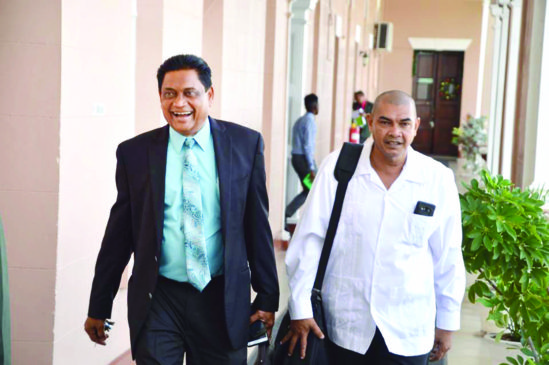
…CCJ validates passage of No-Confidence Motion toppling Govt
The Caribbean Court of Justice (CCJ) on Tuesday threw out Government’s arguments and ruled that the No-Confidence Motion (NCM) that toppled it on December 21, 2018 was indeed validly passed.
Handing down the decision was CCJ President, Justice Adrian Saunders, who read a summary of the final judgement. Justice Saunders said that the Court found that 33, and not 34 as the Government and supporters have argued, was the majority the Opposition needed out of 65 Members of Parliament (MPs) to pass the motion.
“The CCJ decided that the requirement for “a majority of all the elected members of the National Assembly”, referred to a majority of the total number of votes or seats in the Assembly, irrespective of the number of members who actually vote.”
In determining that majority, he added, the Court was of the opinion that the “half plus one rule was not applicable”. Justice Saunders informed the courtroom and viewing public that the majority was clearly at least 33 votes.
The CCJ also rejected arguments that former Alliance For Change (AFC) MP Charrandas Persaud was constrained from voting against his list, a major plank of the State’s case. Justice Saunders noted that nothing in the Constitution prevents a crossover vote and as such, his vote was and still is valid. The No-Confidence Motion, the CCJ decided, was validly passed.
Meanwhile, Justice Saunders informed that CCJ Judge Maureen Ragnauth-Lee had made the observation in her concurring judgement that the Constitution has to be clear regarding Persaud being prevented from voting against his list. She did not believe, as the Government argued, that such a provision was implicit.
On the matter of Persaud’s dual citizenship, Justice Saunders noted that the Court had decided that had the Government really wanted Persaud out of the National Assembly on those grounds, it would have challenged his presence on the candidate list and eligibility to enter the National Assembly long before the vote – in fact, within a month of the coalition’s victory in 2015.
“Dual citizens are not allowed to put themselves up for candidacy in elections to the National Assembly. The Court found that the National Assembly (Validity of Elections) Act required that a petition alleging that Mr Persaud was disqualified from running for office would have had to be filed in the High Court of Guyana within 28 days after the publication of the results of the 2015 election.”
“Since this case was filed in January 2019, the Court held that the challenge to Mr Persaud’s election to the Assembly had been out of time. The Court also rejected the submission that Mr Persaud was absolutely required to vote against the motion of no confidence along with other members of the Government,” Justice Saunders announced.
When it comes to consequential orders, Justice Saunders noted that submissions would be heard in this regard on June 24, 2019.
In the immediate aftermath of the vote, former Attorney General Anil Nandlall described the ruling as a triumph for the rule of law. On the other hand, Attorney General Basil Williams admitted that the CCJ “knocked them down” on every conceivable point.
President’s response
Meanwhile, President David Granger, in a public address soon after the announcement from the CCJ, claimed to respect the ruling. On the other hand, Granger went back to the position that House-to-House Registration was still necessary, even though the activity would push elections back until after November 2019 and was advised against by the Guyana Elections Commission’s own legal adviser.
“The Chairman of the Guyana Elections Commission, Justice Patterson, has previously informed me that the Commission will be ready to hold elections in November 2019. This will be after the completion of House-to-House Registration. I now await a recommendation for a specific date from GECOM and I will then issue a proclamation,” Granger said.
The list of electors, which was used as recently as the last Local Government Elections last year, only expired April month-end. Further, legal arguments are that a simple and less time-consuming claims and objections process can be embarked upon to update the list to ensure persons eligible to vote are registered. This was, however, ignored by the President in his address.



